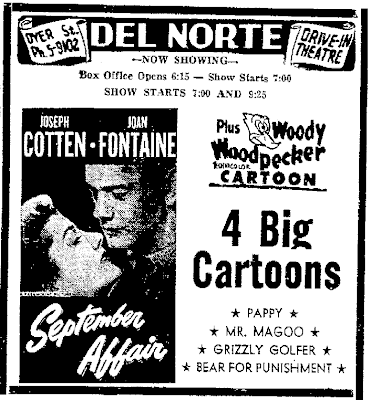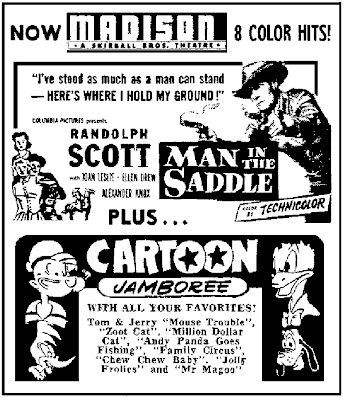 One generation grew up with “The Mickey Mouse Club” and the “Wonderful World of Color.” Another did the same with “The Disney Afternoon.” And, of course, today we have The Disney Channel, Disney Junior and Disney XD (né Toon Disney). So it’s odd that Uncle Walt himself thought the idea of getting into television would be a terrible and costly one.
One generation grew up with “The Mickey Mouse Club” and the “Wonderful World of Color.” Another did the same with “The Disney Afternoon.” And, of course, today we have The Disney Channel, Disney Junior and Disney XD (né Toon Disney). So it’s odd that Uncle Walt himself thought the idea of getting into television would be a terrible and costly one.
Of course, some context helps to explain Disney’s feelings. He expressed them in 1952, a time when panicky movie studios were selling off their back catalogues of films to the highest bidder, who’d shop them around to television; after all, studios made movies, they weren’t in the TV syndication business. That’s what Disney had in mind when he made his comments about TV to the United Press’ Hollywood correspondent. When Disney went into television, he did it differently, keeping his old films and reworking them into something completely different. Eventually, Walt would eventually become a recognisable TV star in his own right, introducing snippets of this and that, or introducing Ludwig Von Drake introducing snippets of this and that, cobbled together in an almost-seamless hour-long show.
But let’s go back 60 years to see what Disney had to say about the Box That Berle Came In.
Walt Disney Spurning $8 Million in TV Offers
By VIRGINIA MacPHERSON
HOLLYWOOD, Dec. 18 (U.P.) — Walt Disney, who’s turned down a reported $8 million in TV often, said today he did it because he doesn’t want to go into competition with himself.
“I still have confidence in the movie business,” the cartoon genius explained quietly. “I happen to think it’ll still be around for a few more years.”
And as long as it is, Disney’s a cinch to keep raking in the dough. Any time he feels he could use another old million or two, he just re-releases one of his full-length cartoons.
“The television people want to buy my films,” he shrugged. “But I’m not selling. Why should I? They’re still good for movie theaters. And, because they’re timeless, they always will be.”
Which is why he can’t see any sense in selling “Alice in Wonderland” or “Cinderella” or “Bambi” to the co-axial cable gents. He can make more dough putting ‘em in the vault for a year or two and then slamming ‘em out again.
But Disney makes one concession every Christmas. He puts on an hour-long TV show for the kids. This year his fantasy on CBS-TV will give ‘em a peek into “Peter Pan” and “Snow White,” which’ll be making the rounds again by Easter.
“But I insisted on one thing,” he added. “And the sponsors agreed with me. No commercials. All we do is tell you the name of the sponsor . . . and that’s that.
“My big beef with television is the stupid commercials. They’re in bad taste. And there are too many of ‘em. Why, I’ve watched shows that have been interrupted six times in 30 minutes to plug a product.
“This is bad showmanship. It’s hurting television.”
It could even be another reason why he turned down that $8 million. Disney makes cartoons because he loves ‘em. So do the 600 people who work for him.
Disney makes sure of this with a concentrated “love-thy-job” campaign. The commissary serves rare roast beef at half what it costs him. There’s even beer on ice. . . . The only studio in town that lets the bars down this far.
“Why not?” the boss shrugs. “This way they’re a lot more apt to have one beer and get back to work on time. If I didn’t sell it here they could go off the lot and maybe have a coupla martinis and never get back.”
He has a good way of keeping ‘em on their toes on the job, too. He shows ‘em what the competition’s turning out.
“Only the best ones,” he added. “I never show a bad cartoon from another studio. That tends to make everybody here get fat and lazy and smug.
“But when they see a good one somebody else has made they charge out and work twice as hard.”
Walt is still passing himself off at the benevolent employer, kindly supplying food and drink to his hard-working (and anonymous) crew. Reporter MacPherson apparently didn’t contact Art Babbitt for reaction.
Disney also apparently didn’t really mind commercials too much—so long as they were made by his studio for a profit or, better still, were infomercials plugging his latest ventures.
 Fortunately, Disney had the foresight to find a way to put his old material on television in a way that he wasn’t re-releasing it to theatres. He not only provided memories for today’s geezers—even I tuned in occasionally on afternoons to watch some great opening animation ending with Donald Duck banging a gong—he introduced people on Sunday evening to some of the fun sound shorts of the late ‘20s and early ‘30s. And unlike Warner Bros., whose cartoons were making money for AAP and Sunset and everyone but Warner Bros., Disney kept reaping the financial benefits that allowed him to move into the future. It all happened because Walt Disney finally gave television a try.
Fortunately, Disney had the foresight to find a way to put his old material on television in a way that he wasn’t re-releasing it to theatres. He not only provided memories for today’s geezers—even I tuned in occasionally on afternoons to watch some great opening animation ending with Donald Duck banging a gong—he introduced people on Sunday evening to some of the fun sound shorts of the late ‘20s and early ‘30s. And unlike Warner Bros., whose cartoons were making money for AAP and Sunset and everyone but Warner Bros., Disney kept reaping the financial benefits that allowed him to move into the future. It all happened because Walt Disney finally gave television a try.
(Above right: Big Bad Wolf, voiced by Billy Bletcher, getting pounded in “The Three Little Wolves”).







































